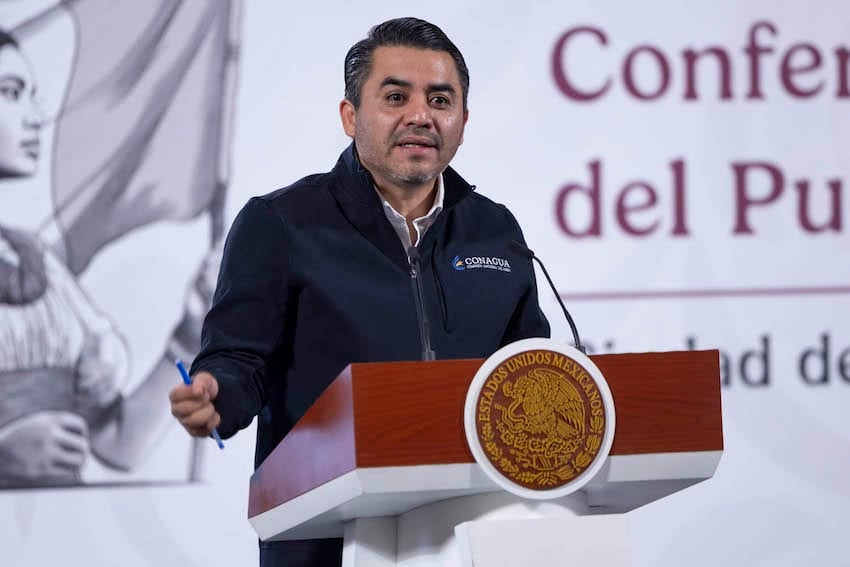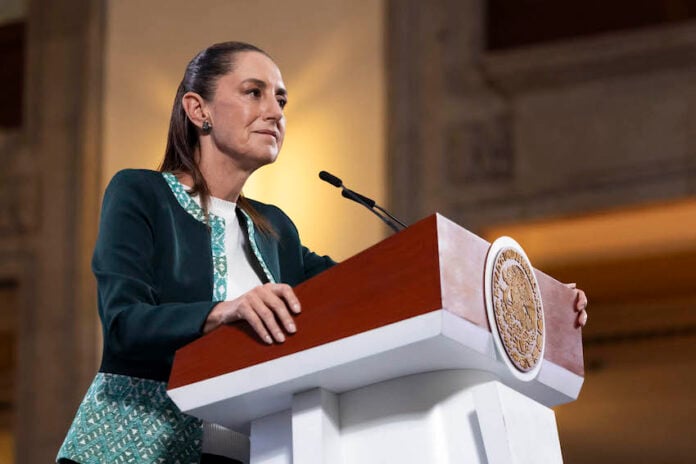President Claudia Sheinbaum’s Wednesday morning press conference took place as truckers and farmers continued to block highways in various states across the country.
Truckers are demanding that the federal government take greater action to combat insecurity on the nation’s highways, while farmers want higher guaranteed purchase prices for the crops they grow.
Farmers are also opposed to aspects of the government’s proposed water legislation, claiming that they will lose the right to transfer, inherit and bequeath water concessions.
In that context, Sheinbaum invited National Water Commission (Conagua) Director Efraín Morales to her mañanera to speak about the government’s plans to establish a new General Water Law and modify the existing National Water Law.
The president also spoke about the government’s water legislation as well as farmers’ demand for a higher guaranteed purchase price for corn, Mexico’s most important staple.
Conagua chief comments on proposed water legislation
Morales said that “the main change” put forward by the federal government in its proposed legislation is for water to cease being seen as a “good” and instead be recognized “as a human right” and a “strategic” resource “for the development of our country.”

If, as expected, the legislation is approved by the Morena party-dominated Congress, the Mexican government will be the only entity authorized to issue water concessions, he noted.
“It will no longer be possible to transfer concession titles between private individuals because this has had serious repercussions, creating great inequality in terms of distribution,” Morales said.
However, rights that allow water concessions to be bequeathed to one’s children will be maintained, he said.
The Conagua chief also said that property owners will retain their right to effectively pass on a water concession if they sell their land, although that won’t be allowed if the way in which the water is used will change, from agricultural use to industrial use, for example.
“A new concession title will be granted in the name of the new owner,” Morales said.
“Have complete certainty that this will be the case,” he said, apparently seeking to reassure farmers who are adamant that the proposed water legislation will have an adverse impact on them.
Morales also said that the proposed water legislation will “strengthen procedures to combat water theft” and increase penalties for that crime.
In addition, a national water reserve will be created, “which will allow us to have enough water to guarantee the human right to water,” he said, adding that said reserve will especially benefit “indigenous communities” and other “communities that unfortunately don’t have concessions that allow them to have a constant supply.”
Among other remarks, Morales said that the proposed legislation will combat acaparamiento (water hoarding or stockpiling) and establish regulations for rainwater harvesting.
“We are promoters of rainwater harvesting. It’s a mechanism that helps farmers a lot and communities in high areas [of the country],” he said.
Sheinbaum defends proposed water legislation
Sheinbaum said that one of the main aims of the government’s proposed water legislation is to bring to order the water concessions that have been issued in Mexico over an extended period of time.
Reviewing hundreds of thousands of water use permits is a key focus of the National Water Plan that was presented by the federal government in late 2024.
Sheinbaum said that concessions for millions of cubic meters of water have been issued to farmers and companies that are not using the water they have a legal entitlement to. Because they have permits for that water, it can’t be used by anyone else, even when the concession-holders aren’t using it, she said.
Sheinbaum said that the proposed water legislation will prevent farmers and companies from selling stockpiled water to third parties, and from transferring concessions in cases in which the use of water will be changed on a property that is sold.
“For example, if you have a property [where] you use the water for irrigation, now you won’t be able to sell it to the real estate developer who is going to build homes on your land. … Now you’ll have to return [the water concession] to Conagua, and he who is going to build houses will now have to ask for [a concession] from Conagua,” she said.
“So, we’re establishing order and guaranteeing water as a human right and as a resource of the nation,” Sheinbaum said.
“Does that limit development? No, it brings order [to water], a resource that is so important for the whole world and for Mexico.”
Farmers occupy Ciudad Juárez customs facility, halting border trade in protest of water law
Sheinbaum conceded that the proposed water legislation, as it was originally written, may have “one error” or “another” in it, and therefore expressed support for modifications to be made where necessary.
Like Morales, she rejected claims that a farmer won’t be able to bequeath a water concession to his children.
“Now, they’re wanting to say that an ejidatario [communal land owner], if he has a well on his plot, won’t be able to give that water to his children. False — of course he can,” she said.
A message for potential investors
Sheinbaum stressed that the government’s prioritization of water as a human right doesn’t mean that it doesn’t want industrial development or investment in Mexico.
However, if companies are proposing investment projects in Mexico that use a lot of water, it would be better for them to go to Veracruz, Campeche or other parts of southern and southeastern Mexico, “where there is more water,” she said.
One company that shifted a project from northern Mexico to Veracruz is Constellation Brands. The U.S. beverages company had to halt its brewery project in Mexicali, Baja California, after citizens overwhelmingly rejected it over water concerns in a vote held in early 2020.
Sheinbaum: Government can’t afford to increase guaranteed purchase price for corn
In recent months, farmers have protested against what they see as low and unsustainable prices for their produce at a time when their costs are significantly higher than they were in the recent past.
One of their central demands has been for the federal government to raise the guaranteed purchase price for corn to 7,200 pesos (US $392) per tonne. The guaranteed price was set at 5,840 pesos per tonne for small producers at the start of 2025, although it has increased slightly in some states.
Sheinbaum said that farmers are asking for a “very high” guaranteed price for corn, and declared that “there are not enough resources to be able to fulfill it.”
Still, the government “always” seeks to assist farmers, especially “small producers,” she said.
In October, in conjunction with state governments, the federal government offered 950 pesos per tonne of corn in direct support for corn producers in three Bajío region states. On Tuesday, the Agriculture Ministry announced that an agreement had been reached with corn growers in Campeche that will see them receive the same amount of direct support per tonne.
Asked whether corn producers in other states could benefit from a similar scheme, Sheinbaum highlighted that dialogue is ongoing.
“That’s why I said yesterday, ‘Why are they blocking highways if the table of dialogue is open?’ … Alternatives are being sought, but they’re blocking highways anyway,” she said.
By Mexico News Daily chief staff writer Peter Davies (peter.davies@mexiconewsdaily.com)
